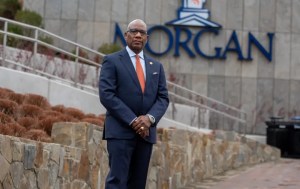By Mylika Scatliffe,
AFRO Women’s Health Writer,
mscatliffe@afro.com
Thanksgiving is the kickoff to the winter holiday season. This time of year invokes warm images of families gathered for holidays, preparing to dig into feasts reminiscent of Norman Rockwell paintings or Big Mama’s table in the cult classic film, Soul Food.
Unfortunately, the reality is that today trips to the grocery store are daunting. This week many of us left the grocery store having spent more money than we did this same time last year, but with less food.
“November 1 – January 1 is the time when everyone is ‘activated’ around the issue of food and trying to prevent hunger,” said Stacey Stephens, director of B’More for Healthy Babies, Promise Heights in Baltimore. “We want to make sure that access continues all year round.”
Food insecurity is the limited or unknown availability of nutritional and safe foods for everyone in a household to meet their basic needs.
According to the United States Department of Agriculture (USDA), 10.5 percent of households experienced food insecurity in 2020. About four percent of households experienced it in its most extreme form– meaning people ate less or skipped meals altogether because they were unable to access food.
This year Baltimore Mayor Brandon Scott announced an allocation of an additional $11 million to fight food insecurity in Baltimore with the American Rescue Plan Act, increasing the total to $26 million.
Charm City saw food insecurity rates increase from 18 percent to 21.7 percent during the pandemic, with 33 percent of children being affected. According to a press release from the Scott Administration, “the additional $11 million investment will support five key pillars of the Department of Planning’s Food Policy & Planning Division’s nutritional security programming:
1) Continuation of produce box distribution
2) Online Supplemental Nutrition Assistance Program (SNAP) fruit and vegetable incentives
3) Expansion of nutrition incentives at farmers’ markets
4) MedStar Harbor Hospital’s Good Food Rx program
5) The Farm Alliance of Baltimore’s Black Butterfly Urban Farmer Academy”
“Higher food prices have shocked the budgets of families, seniors and people already struggling to make ends meet. The impact of these higher prices is especially felt with the holidays right around the corner,” said Katie Fitzgerald, president, and chief operating officer of Feeding America, the largest hunger relief organization in the United States.
Maryland has one of the highest costs of living in the country. Food insecurity is an issue that is more likely to plague people with lower income, enduring homelessness, or who are unemployed. Inflation has exacerbated these issues and affected those across socioeconomic lines. Mayor Scott simultaneously seeks to improve city residents’ access to affordable healthy food and address the food supply chain quagmire that persisted throughout the pandemic.
“Due to inflation, Maryland households are now spending over $400 more per month to buy the same goods and services they purchased last year. That’s especially tough for lower-income households that have limited budgets to begin with, but even middle-class families are starting to seek support from our food assistance networks to help supplement their food budgets,” said Carmen Del Guercio, chief executive officer, and president of the Maryland Food Bank.
Adding to the struggle are food banks having to contend with increased food prices and demand. Every month food charities are seeing more and more people looking to supplement their food budgets.
In her work with B’More for Healthy Babies, Stephens often has the opportunity to assess families for food insecurity, and takes note that families commonly experience food shortages at the end of the month, when money or SNAP benefits are depleted. Many families struggle at the end of the month as they wait to replenish their bank accounts or wait for SNAP benefits to reload for the beginning of the next month.
Stephens, along with Meaghan Tine, a diabetes social worker at the University of Maryland School of Medicine Division of Endocrinology, Diabetes, and Nutrition, founded the Freedom Food Initiative.
“During the pandemic we were able to partner with Black and woman owned caterers to provide nutritious, cooked meals for families. They were prepared the fourth Friday of every month and prepared in such a way they were easy to eat right away or freeze for later,” said Stephens. This initiative continues today, also partnering with the school community and local city churches, including New Metropolitan Baptist Church, Brown Memorial Episcopal Church, St. Catherine’s Episcopal Church, Memorial Episcopal Church, and Madison Avenue Presbyterian Church.
“We want people to be able to access nutritious and safe food and acquire it socially acceptable ways,” continued Stephens.
New Metropolitan Baptist Church has been feeding the local community for over 30 years as part of their Bread of Life food ministry. Anyone in need of a meal could go have a meal there three days a week – lunch on Tuesdays, breakfast on Wednesdays, and dinner on Thursdays. While the pandemic caused the ministry to be shuttered for a while, they have recently returned to Thursday night dinners, including an annual Thanksgiving day meal with all the traditional Thanksgiving fixings.
Heidi Boyd has served as part of the breakfast ministry at New Metropolitan since 2010.
“I began serving in this ministry because of my desire to serve the community in some way. It is a humbling experience, realizing that ‘but for the grace of God go I,’” said Boyd. “We see a lot of regular faces; we get to know some of them by name and miss them when they don’t show up.”
Over 53 million people nationwide relied on charitable food assistance last year to put food on the table, according to Feeding America.
“As families come together this Thanksgiving, there will be millions unable to put food on their table. Thanksgiving meal staples, like turkeys, can be cost-prohibitive. Food banks are anticipating higher demand and working hard to provide alternatives where they can. We need everyone to be a part of overcoming these challenges; the government, private sector, food donors, and folks who can contribute and raise awareness about this solvable but difficult problem,” said Fitzgerald.
Boyd began taking part in preparing and serving the annual Bread of Life Thanksgiving dinner at New Metropolitan in 2013 and spearheading it beginning in 2015. In 2016, the dinner was renamed the Jefferey Cameron Curtis Thanksgiving Dinner, after her late son who tragically and suddenly passed away in 2015. His favorite holiday was Thanksgiving. Hygiene care packages are also handed out to anyone who attends the meal and needs one. She continues to spearhead this annual meal today.
With so many people suffering from food insecurity, reducing food waste is crucial.
According to the United Nations, around 14 percent of food produced between harvest and retail is lost globally, while an estimated 17 percent of total global food production is wasted. Eleven percent of that waste occurs in households, five percent in food service, and two percent in retail. Food waste negatively impacts food security and availability, contributing to the increasing cost of food.
The current rate of inflation makes this unacceptable.
“Food for sustenance is necessary for pregnant women to deliver healthy babies and for the brain development of young children. Children need nourishment so they can focus and retain information they are learning in school,” said Stephens. “Food and hydration are critical to sustaining the health and well-being of our families and the community.”
Help us Continue to tell OUR Story and join the AFRO family as a member –subscribers are now members! Join here!
The post Local organizations work to fight food insecurity during the holiday season appeared first on AFRO American Newspapers .










